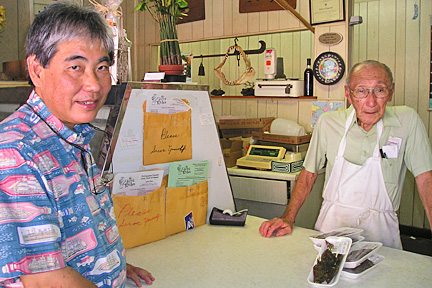
|
Wakamatsu family keeps
Wailuku fish market fresh
A second generation develops
new appreciation for its
old-style sashimi
WAILUKU » Wielding a butcher's knife, Kanji Wakamatsu deftly cuts along the spine of a 70-pound ahi and shows how meat along the bone can be scooped out with a spoon to make thin slices of sashimi.
"That's the fillet mignon, the nakochi," said Wakamatsu, 84, whose family market in Wailuku has been in operation for more than 82 years. "We do the old-style way. You don't waste anything."
The art of fish cutting and its careful preparation has been an important tradition in the Wakamatsu Fish Market family on Maui, helping to raise generations of children and allowing many to obtain an education.
The market's sakura-boshi -- fish dried with a family recipe of teriyaki sauce -- remains a popular item, selling out on most days.
"This one is good," said customer Alvin Tagomori.
The dean of students at Maui Community College said he was buying several sakura-boshi orders for a party.
The store is located in the old section of Wailuku town, on the mauka side of North Market Street, as the sidewalk begins to slope down toward Happy Valley.
While many stores in Wailuku have closed in the last 25 years, Wakamatsu Fish Market has weathered economic downturns and is now seeing the arrival of a new wave of businesses and customers.
Near the fish market is a cafe with periodic live jazz and blues music, and a new bookstore with monthly poetry slams.
For quite a few longtime residents, Wakamatsu's market remains a cultural anchor - and a place where the prices are reasonable.
The fresh ahi is usually a dollar or two cheaper per pound than in most other stores, and Wakamatsu also makes bagoong, a Filipino fish sauce.
Wakamatsu said the secret is low overhead.
He's the manager, butcher and main salesman, although his wife, Ann, sometimes helps him behind the counter.
A retired branch manager for American Security Bank, Wakamatsu said he took over the business from his brother Yasushi and his wife, Mary, about four years ago.
He said he wanted to continue the family business -- one that his late mother Ito worked at until she was 92.
Ann is less enthusiastic about the venture.
"I thought I married a banker. I didn't think I'd get stuck in a fish market," she said jokingly.
Wakamatsu recalled that while he was growing up in the 1920s, his father, Isaburo Wakamatsu, operated three fishing sampans based out of Maalaea.
Isaburo, who worked in the sugar plantation before starting his business, drove a Model-T Ford to make deliveries along with eldest son Kanji, who rang a bell to announce their arrival.
"We used to go to the (sugar cane) camps to sell fish to the families," he said.
Kanji himself cut his first fish at age 10.
He said he held three jobs in his early years -- at a bank, ushering at the old Iao Theatre and bookkeeping for his cousin.
"It was a lot of work," he said.
But while operating his fish market is also hard work, it's nothing like the past, he said. And he enjoys seeing old customers.
"I'm going to beat her record at 93," he said of his mother's retirement.
[News] [Business] [Features] [Sports] [Editorial] [Do It Electric!]
[Classified Ads] [Search] [Subscribe] [Info] [Letter to Editor]
[Feedback]
